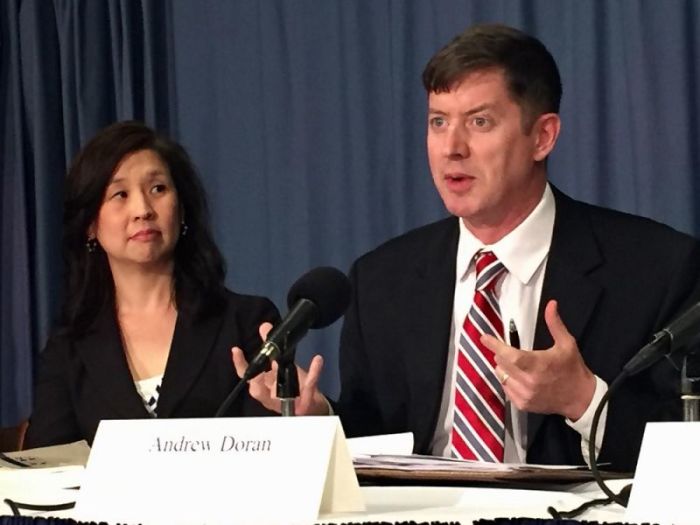State Dept. Workers Called Religious Freedom Specialists 'Whack Jobs,' Former Official Says

WASHINGTON — The issue of religious freedom and even persecuted Christians in the Middle East are held in low regard by employees at the U.S. State Department thanks to a culture of institutional bias that plagues the department, a former agency employee has said.
Andrew Doran, a former executive secretariat of the U.S. National Commission for the U.N. Educational, Scientific, and Cultural Organization at the State Department, participated in a panel discussion Wednesday night with other human rights lawyers at the National Press Club to discuss religious liberty and human rights in the Donald Trump administration.
Doran, who now serves as the vice president and senior policy advisor for the human rights advocacy organization In Defence of Christians, explained that he feels there is not much that the Trump administration can do to improve the depressing status of religious liberty worldwide.
"On the religious freedom front, we are getting our clock cleaned. This may be a brief interregnum here but I think religious freedom is not doing well worldwide," Doran said. "The United States is not leading in religious freedom. It's not doing well domestically. I don't know that any program at State [Department] is going to change this. I mean, this is something that is deeply rooted in the public culture, in academia."
Doran explained that for decades, the foreign policy establishment has viewed institutional Christianity as an "oppressor" class. Doran added that this establishment view has "extended to Middle East Christians, which we see all the time dealing with people in the foreign policy establishment who really hold Middle East Christians in very low regard."
"It is a perpetual challenge and it is deeply disconcerting," Doran said, adding that IDC and other groups' efforts to get the U.S. government and Congress to recognize that the Islamic State is perpetrating genocide against Yazidis and Christians in northern Iraq last year was a "much heavier lift than it probably ought to have been."
"I think [this] is another example of a sort-of institutional bias perhaps against Christians," Doran said. "At its most benign and its most innocuous, viewed most favorably to the foreign policy establishment, I think you could say that is an inclination not to appear to be biasd in favor of Christians. But I am skeptical of that for a variety of reasons."
One of the reasons Doran suggested is that "the foreign policy machinery" is being run by people who most likely don't share the values of the average Christian or citizens concerned with religious liberty at home and across the globe.
"Here again, we are back to the problem of the governing and the governed being on different paths, but there is very often a very open hostility to Christianity, to traditional values and even to religious freedom," Doran asserted. "I'm thinking now to conversations I have had at the State Department where people in the International Religious Freedom Office were referred to as, 'Oh, those whack jobs,' which is somewhat astounding for public servants."
The State Department's Office of International Religious Freedom was created by Congress when it passed the International Religious Freedom Act of 1998.
Emilie Kao, who worked in the Office of International Religious Freedom from 2005 until 2012 and served as the leader of the office's East Asia Pacific team, agreed in an interview with The Christian Post after the panel discussion that "there is not a high degree of regard for international religious freedom" at the State Department.
"When you go back and look at the way the office was created, it was not an indigenous creation of the State Department. It was created by congressional act, the International Religious Freedom Act of 1998," she said. "So, it has always been viewed as an external creation. I think it has had a hard time — the issue and the office — really gaining trust of other bureaus in the building."
Doran told CP that he doesn't believe the attitude toward the office is because it's congressionally mandated.
"You have many offices that are congressionally mandated that are more consistent with the values of most of the people who work at the State Department," he said.
Doran added that there is not much Trump can do to change the culture in the State Department.
"The number of political appointees is so few that they can't really change the culture of something like the State Department, which is one of the oldest federal agencies that we have," he said. "Even cutting 30 percent of its budget, it's going to do nothing to really change that, nor will fulfilling appointed positions. It will do nothing to change the institutional culture there, really. This is a much deeper cultural problem that goes to kind of a crisis of our public culture in the West."
Kao stressed the importance of Trump not delaying when it comes to nominating someone to be the ambassador at-large for international religious freedom, a position that was left vacant for the first 845 days of Barack Obama's presidency.
She also called for the quick appointments of the White House advisor for international religious freedom, special envoy to the Organization of Islamic Cooperation and assistant secretary of state for democracy, human rights, and labor.
"One of the things that the administration is going to do is put together a national security strategy. That is the blueprint for the entire government to promote U.S. interests abroad. So, the earlier that you can get somebody into those positions and get them at the table in crafting a national security strategy, the more you have that valuable input and reflects an understanding of the religious dynamics on the ground," Kao said. "It is critical that they do this in a timely manner because if they appoint these people much later on, that foundation for the entire government will already be set in that strategy.




























